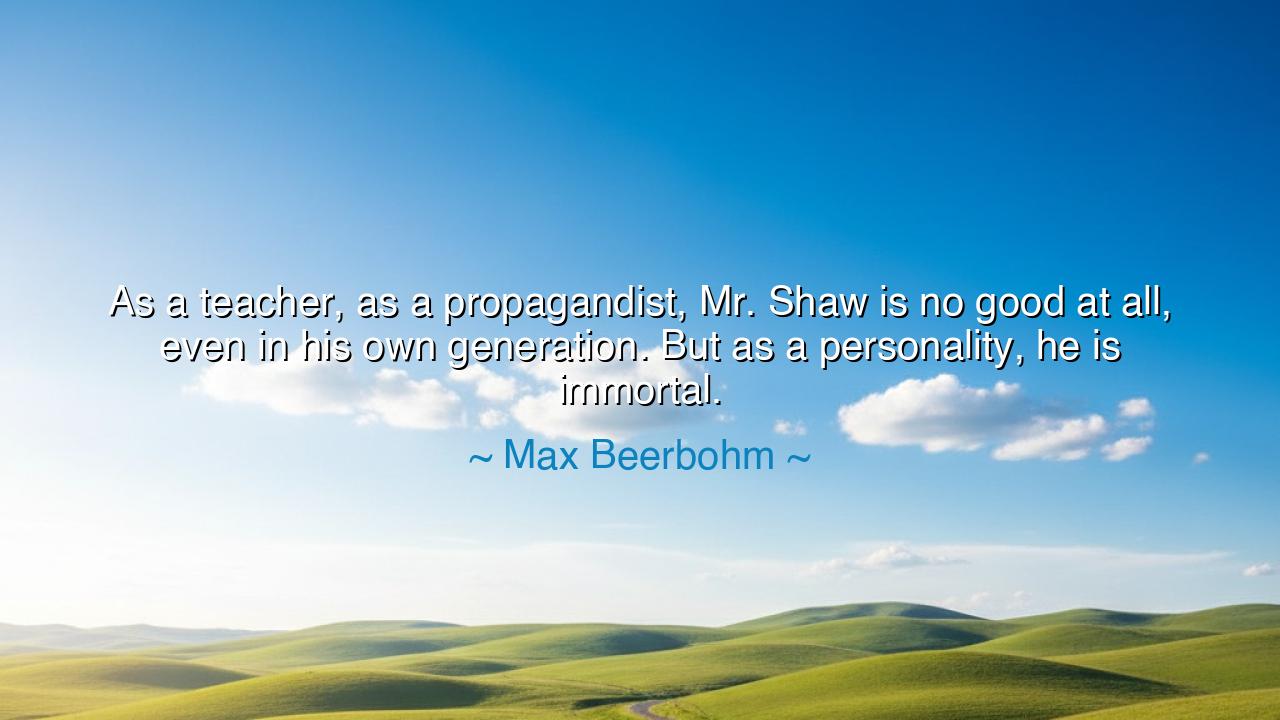
As a teacher, as a propagandist, Mr. Shaw is no good at all
As a teacher, as a propagandist, Mr. Shaw is no good at all, even in his own generation. But as a personality, he is immortal.






Max Beerbohm, the satirist of gentle wit and sharp judgment, once wrote of his contemporary George Bernard Shaw: “As a teacher, as a propagandist, Mr. Shaw is no good at all, even in his own generation. But as a personality, he is immortal.” In this phrase, he draws a line between the fleeting influence of teaching and propaganda and the enduring fire of personality. Beerbohm suggests that Shaw’s power did not lie in the doctrines he tried to impose, nor in the lessons he attempted to drill into society, but in the sheer brilliance of his being—his wit, his energy, his defiance, his voice.
The origin of these words comes from the clash of two great men of letters in early twentieth-century England. Shaw was known not only for his plays but also for his relentless arguments about politics, morality, and society. He sought to be a teacher of the masses, to reform society through words. Yet Beerbohm, observing with the eyes of an ironist, saw that Shaw’s greatest legacy was not his systems of thought, which might rise and fall with the tides of history, but his personality, which shone like a torch beyond the boundaries of his own age.
History gives us many examples of this divide. Socrates taught his disciples with questions, yet he left no writings of his own; his philosophies survived because of his personality—his courage to drink the hemlock, his relentless pursuit of truth. Oscar Wilde, like Shaw, wrote with dazzling wit, yet it is not his social doctrines that endure, but the immortal flame of his style and spirit. In the same way, Shaw’s plays continue to live, not because people embrace all his arguments, but because his voice carries an energy that transcends the immediate message.
The emotional weight of Beerbohm’s words lies in the recognition that ideas may fade, but personality endures. A teacher may fail to persuade his contemporaries; a propagandist may fail to sway the crowd. But if the person himself embodies vitality, originality, and courage, his presence alone becomes immortal. The lesson is not to dismiss the importance of ideas, but to remember that it is often the human spark behind the words that lights the fire of memory.
This observation is also a warning. One may labor all his life to instruct others, yet instruction is often forgotten. One may fight to persuade a generation, yet persuasion may dissolve with time. But if one lives with authentic passion, with humor, with conviction, then even when his doctrines die, his character will remain as a beacon. Thus, Beerbohm tells us that Shaw, though not always successful as a social guide, carved his immortality through the force of who he was, not merely what he taught.
The lesson for us is profound: strive not only to preach, but to be. Ideas alone are dust without the life of personality animating them. To influence generations is not simply to lecture or instruct, but to embody the truth you seek to share. If you are fiery, be fiery; if you are gentle, be gentle. Live your convictions with the force of personality, and your life itself will become the teaching, stronger than any pamphlet or lecture.
Practically, this calls us to cultivate authenticity and presence. Do not hide behind abstractions; let your humanity show. If you wish to influence others, live in such a way that your being speaks louder than your words. History will not always preserve systems and arguments, but it remembers those who carried themselves with unforgettable vitality. In the end, as Beerbohm reminds us, it is the immortal personality—the spark of life itself—that endures across the ages, long after the lessons and propaganda have crumbled into dust.






AAdministratorAdministrator
Welcome, honored guests. Please leave a comment, we will respond soon